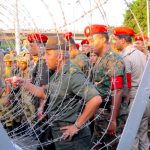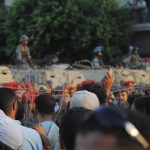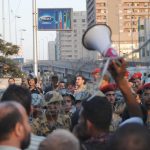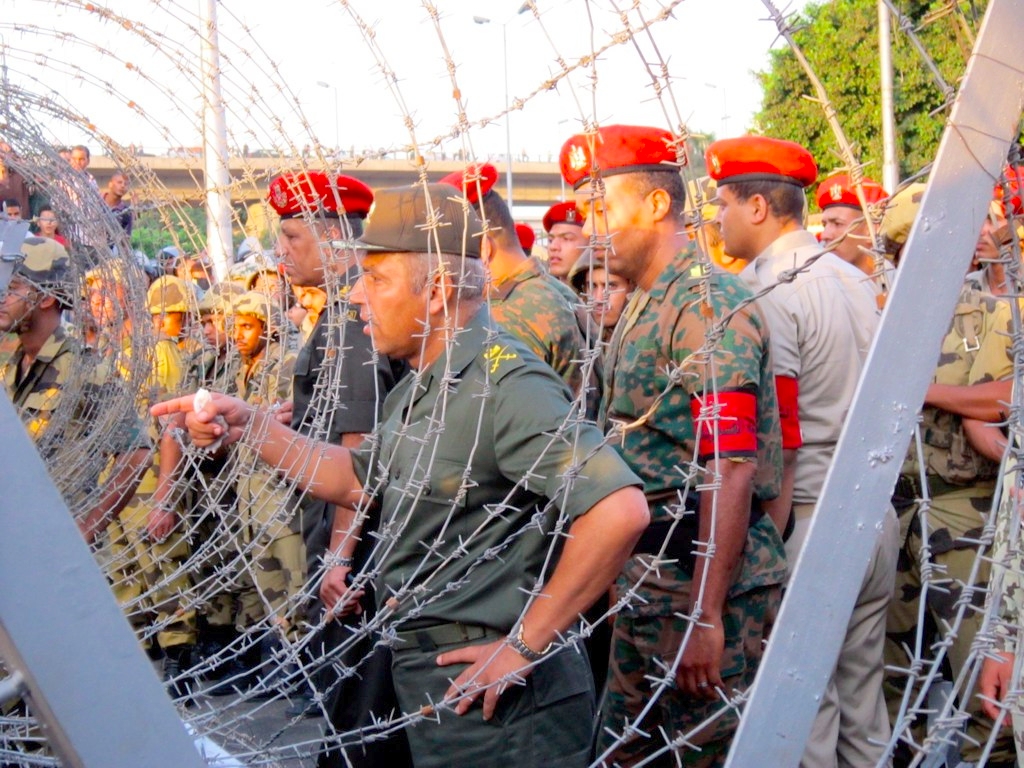Karim Malak from Egypt reports on an incident on Armed Forces day, 23 July 2011.

On 23 July 2011 the Egyptian military cautiously began marking Armed Forces day. The night before, the military had issued a communique on their Facebook page incriminating the group “6 April”, a large civil society organisation and opposition movement.
In response, activists spread the call for a march to the Supreme Council of Armed Forces (SCAF) (Twitter hashtag: #SCAF). As thousands of people marched from Tahrir Square to Abbasiya to protest it soon became apparent that the violence that broke out had been orchestrated. A chaotic scene soon engulfed in Tahrir Square.
As protesters were attacked by thugs and came under fire from ammunition and tear gas, they chanted “selmiya” (peaceful). Not only have protesters stood up to the military in a battle of hearts and minds, as well as politically, but they have been subject to attack by sophisticated anti-riot gear, blank shots, sometimes also live ammunition, and the terror from the skies, helicopters and low flying F16s.
Egypt’s military is one of the few in the region, and arguably the world, to completely modernise its tank, aircraft and mechanised division, supplanted by more than a billion dollars in military aid per year.

An investigative journalist in the Guardian (Pratap Chatterjee, Egypt’s Military Industrial Complex) dates back weaponry used against rioters pre-January 25 Revolution to Western-made equipment. Sophisticated jamming gear is also used to cut off 3G networks in the area to hinder mobilisation by peaceful protesters and organisers of sit-ins. This software is often used to violate privacy by hacking email, twitter and facebook accounts. This is done by a firm based in the UK called Gamma Group.

This is all supplied by an intricate arms trading ring based in the West, perpetuated by corrupt military regimes often by using kickbacks and perpetuated by Ministries of Defense in the West to supplement huge budgets. Egypt is one of eight countries that from 2001-2007 imported at least once small arms worth more than $100 million. (1)
A 2010 report by the International Small Arms Survey in Geneva think tank, Gangs, Groups and Guns, indicated that often these deals are solicited through third parties making them harder to trace and detect because deals are conducted to transit destinations and clients which are not covered by all Small Arms Trade conventions in the UN.(2)
While Egypt continues to fare well in its fight against authoritarianism and moves towards democracy, it inches back in the face of military rule, supported by lucrative deals supplying Western weapons that inevitably are used against their population.
Simon Bolivar said: “Damned is the soldier who shoots against his own people”

In this case not only is this weaponry not local, but it is a sweetener for better relations with the SCAF. Such is the political economy of arms deals. With no foreseeable way to end that relationship, the merchant of death closes in on the free Egyptian people as these weapons continue to flow into the country.
Although change may have come to the Egyptian people and government, it has yet to spur enough momentum to end this lucrative business for the West, in particular the USA and UK. Today the West is not faring well with change in the Arab world because this risks weapons contracts being voided. To put it simply, the will of the Egyptian people has not been taken into account. The political economy of these deals makes no sense in a country that is in dire need of economic aid and has 40 per cent of its population living in poverty.
The author is a research assistant at the American University in Cairo in the Political Science department to Doctor Holger Albrecht. This piece was written for Campaign Against Arms Trade. All publication rights are otherwise reserved.
——————————————————————————————————————–
Footnotes
1 http://www.smallarmssurvey.org/weapons-and-markets/transfers/importers.html
For more on the Egyptian Military industry complex and their budget read Robert Springborg’s foreign policy piece “Game Over: The Chance for democracy”
http://www.scpr.org/news/2011/02/12/23992/democracy-in-egypt-an-uncertainty-analysts-fear/
See also, Abdel-Khalek, Gouda and Karima Korayem. “Conditionality, Structural Adjustment and Development: The Case of Egypt,” in Olav Stokke (ed.), Aid and Political Conditionality (1995), 272-294. (Current Minister of Social Solidarity)
Small Arms Survey 2004 report shows Egypt as a broker country that has not adopted regulations governing said transactions.
2. The UN resolution implicating an Egyptian arms broker in Liberia is attached below. Scroll down to where it says Victour Bout, Pecous and Liberia.
Report of the Panel of Experts pursuant to Security Council resolution 1343 (2001), paragraph 19, concerning Liberia, United Nations Security Council, S/2001/1015, 26 October 2001

